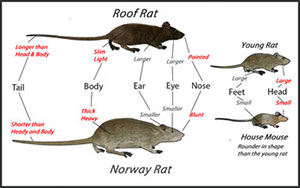Selecting a pet rodent
Pets are an important part of the American household. Your pet-owning experience will be most enjoyable if you carefully consider which pet best suits your family, home, and lifestyle. Unfulfilled expectations are a leading cause of pet relinquishment, so make an informed decision. Take time, involve your family, and give careful consideration to the following questions if you are thinking about a rodent as a pet.
What’s special about pet rodents?
There are a range of small rodent species that offer options from interesting exotics to placid, domesticated species. They usually live in an enclosed habitat like a cage, pen, or hutch, but most will enjoy spending time outside their habitat with their human family. Their size and cage-pet status can make them seem like a less expensive or easier pet-keeping option. However, rodents still require an investment of time, attention, and resources in order to thrive and provide the best companionship for their owners.
Choosing a rodent
It is natural to be drawn to a cute little animal on first sight, but you need to consider which type of rodent might be a good fit for your family
Hamsters
The most common pet hamsters are Syrian or golden hamsters, but albino (white with pink eyes) hamsters are also available. Hamsters housed in pairs or groups may fight, so they are usually housed alone.
Gerbils
Similar in size to hamsters, gerbils are more active and social. Unlike hamsters, gerbils are happier when housed as a pair or in a small group. Potential owners should be aware that purchasing and keeping gerbils may be illegal in some states.

How to Choose Between a Pet Mouse or Pet Rat
Mice and rats are both low maintenance, cute pets. However, they do have different needs and personalities. Choose a rat if you’re looking for a more social, active and clean pet. If you’re on a budget and want a pet that requires little to no handling, a mouse is your best bet.
Choose the right pet for your schedule. Both mice and rats are nocturnal animals and are therefore likely to be hiding and sleeping during the day. Keep this is mind before adopting because they often like to play and make noise at night; keep this in mind when considering adopting a pet rodent
Adopt a mouse if you want a low maintenance pet. You can gently hold and stroke a pet mouse, or leave it to exercise in its cage. In contrast, rats need a bit more attention and will regularly need to be let out of their cage to play. If you don’t want this commitment, get a mouse instead.
Pick your pet based on the cage size it needs. How a rat or mouse cage might fit into your home could be an important factor to consider in deciding which animal to adopt. Rats require larger cages than mice due to their larger size. Both mice and rats should have cages where they can be viewed from the front rather than the top, so as to minimize stress
Choose a rat for a cleaner pet. You will have to clean up after both pet mice and pet rats. However, overall rats tend to be cleaner than mice, particularly in terms of their smell and droppings. Pet rats can also be toilet trained whereas pet mice can’t
How to Choose a Cat Who Will Kill Mice
Choosing a Gifted Mouser
Aloof demigod or cuddly cutie-pie, your cat is descended from countless generations of fierce predators. Under the right circumstances, almost any cat will kill a mouse. However, some cats seem to live for the hunt while others prefer to wait for the occasional mouse to stumble directly into their food bowls.
What Makes a Good Hunting Cat?
When choosing a good mouser, breed matters least. While certain types of cats, including Maine Coons and American Shorthair cats, are known as good mousers, there is tremendous individual variation within each breed.
How Kittens Learn to Hunt: A Skill Honed With Practice and Play
Watch as these kittens learn hunting skills through games and practice. As they begin to hunt, you may notice that their play looks a lot like the games you’ve seen more urban kittens and cats enjoy with their toys. The playful stalking, pouncing, and wrestling of kittens is practice for the hunt.
It’s All Fun and Games Unless You’re a Large and Juicy Rat
Whether you’re choosing a kitten or an adult cat, look for one who plays fiercely. When kittens play, they are honing their skills as little hunters. Watch for cats of any age who “stalk” their toys, or bite them and shake them vigorously. This type of play mimics more serious hunting behavior and is a good indication that a cat will seek out and kill mice.
Where to Find a Good Mouser
If you live in or near a rural area, look for a farm with a litter of barn cats. Plus, many states have barn cat relocation programs, so check the Internet for an organization near you. These kittens will have learned to hunt by watching their mothers, and are more likely to have a few kills under their own belts. An adult barn cat is an ideal choice if you can provide it with an appropriate environment, but may not adjust well to city life.
Top Cat Breeds For Catching Mice
People welcome cats into their households for a variety of reasons. Some just want a fluffy companion to share a couch or bed with, while others have small children who desire a low-maintenance playmate.
Other cat owners choose the domesticated cat for an altogether different purpose. These people appreciate cats for their natural gifts, namely, their hunting instincts. Cats have walked alongside human beings since time immemorial as valued assets for controlling the rodent population. On farms, in port cities and even on the decks of ships, cats have proven themselves worthy business partners for thousands and thousands of years.
Chances are good you don’t ferry spices and silks on ships from the Old World to the New, so maybe you don’t need a cat to keep your lower decks free from pesky mice. Still, no matter where you live in the United States, you’re bound to encounter one of our smaller mammalian friends at one time or another. To catch them, you need a qualified hunting cat.
Cats and Mice: It’s Complicated.
Do cats eat mice? It probably sounds like a simple enough question, but the truth is many people don’t know what their cat gets up to when it’s out in the yard
How to Choose the Right Cat for Hunting Mice
Before we get into the nitty gritty of choosing a perfect hunting cat, know you won’t always have a choice when it comes to breed.

Rodent Control
The word rodent means to “to gnaw.” We will mostly be reviewing the type of rodent called “commensal rodent.” The word commensal means “sharing one’s table.” The three types of commensal rodents are the House Mouse, the Norway Rat, and the Roof Rat. These rodents carry diseases and eat and contaminate our food. These rodents co-exist with humans and closely associate with human habitats for food, water, and shelter. If living conditions for the rodents (food, water, and shelter), are right, they can multiply quickly. In your rodent control program, the essential first step is to eliminate or control their food, water and shelter provisions. After this first step, use the methods of trapping and baiting to get rid of the rodent population. Other types of rodents, such as the white-footed mouse, deer mouse, harvest mouse, pocket mouse, or pack rats may enter buildings, particularly if they are near wooded areas or fields.
Rats are larger than mice, with correspondingly larger heads and feet. Rats also have coarser fur than mice. Mice are curious, while the rat is cautious. You will find Norway rats in burrows and the lower levels of a structure, while Roof rats prefer the upper levels of structures. Inspecting the rodent activity is essential. Use a flashlight to inspect their particular activity. Look for their “droppings”, rodent tracks, gnawing damage, burrows, runways, urine stains, rub/grease marks, and any other sitings of dead or live rodents. They also make screeching sounds, digging, or scratching sounds. If an infestation is well established, you may be able to detect a rodent odor.
To successfully get rid of mice and rats, it is critical to determine which type of rodent you have for effective control. For example, choosing the correct size trap is critical. A mouse trap would be too small for a rat, and a rat trap may not be sensitive enough to catch mice.
Behavior Difference Between Mice And Rats
Since rodents are dependent on their environment, it may be difficult to describe typical behavior and habits. But there are generalizations of their habits for practical purposes of rodent control around and inside buildings
Get Rid Of Mice And Rats
You will want a complete rodent elimination to occur before the rodents move to another area. A successful rodent control program includes a combination of baiting and trapping for the highest rate of success. However, if the rodent population is large, begin with a high quality rodent bait, in order to quickly knock down a population and prevent rapid growth.